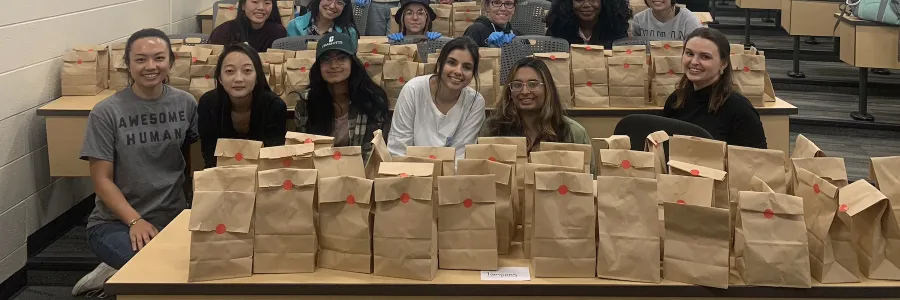By Wyatt Crosher, Communications Coordinator for Student Affairs
Last semester, UNC Charlotte’s American Medical Women’s Association (AMWA) branch set out to fight period poverty, or the social, economical, political and cultural barriers to menstrual products that cause physical, mental and emotional challenges due to the shame and stigma surrounding menstruation.
A part of period poverty is also the lack of menstrual products available for students on campus. A May 2020 study estimated that 16.9 million women in the United States may live in period poverty. Globally, The World Bank estimated in 2018 that at least 500 million women lack the capabilities for proper menstrual hygiene management.
The campus campaign’s first steps came from former AMWA president Lyudmila Grodsky, who believed products like pads or tampons should be accessible for free on a campus of this size. That message is now being passed along by current AMWA president Krishna Majithia, vice president Ainella Rysbayeva and head of the Period Poverty Committee, Lucey Patterson.
Majithia and Rysbayeva are both second-year biology students at Charlotte. Both believe that the Period Poverty Campaign is important in maintaining the wellbeing of students at the University.
“It comes down to serving the needs of the student body,” Majithia said. “We understand that it's not a necessity for the entire student body, but it is for a significant portion. We don't have a choice but to experience this on a monthly basis, so it would really be a great improvement to the University to meet the needs of more of its students."
Rysbayeva started a petition on change.org to raise awareness of the issue, with a link to different ways to help the AMWA fund its short-term goal of buying products and setting up bins with free menstrual products in bathrooms around campus. The petition currently has more than 1,600 signatures.
The ultimate goal of the Period Poverty Campaign is, as written in the petition, “to have the University provide free menstrual products in all female and gender-neutral restrooms on campus,” in the way Charlotte provides other toiletries like toilet papers, soap and paper towels.
Past the petition, AMWA has been doing tabling events on campus throughout the academic year. The feedback has been positive, and not just from women students at the University.
“A lot of females supported our campaign and expressed their positive attitudes toward our goals, but there were also a lot of male students that supported it,” Rysbayeva said. “There were some guys that even asked, 'Don't you already have menstrual products in your restrooms? I thought you did.' And when we said there weren’t, they said, 'Oh, that's a problem.'"
The University has joined in with supporting the project. Dr. Mari Ross, associate vice chancellor of health and wellbeing, is the campaign’s official partner, working to market it across campus. Dean of Students Christine Reed Davis has also endorsed the campaign.
It is an especially important issue in the state of North Carolina, where menstrual products are considered “non-essential goods,” causing an uptick in sales tax. That extra expense can make it even more difficult to obtain products for those who need them, which may have a negative impact in more ways than one.
“Whenever women are using products for prolonged periods of time, they're exposed to higher risks of things like UTIs (urinary tract infections) and toxic shock syndrome, which can be deadly,” Rysbayeva said. “Additionally, the odor associated with the prolonged use of products may make the women feel ashamed, which may lead her to skip work or some classes, and that further puts her at a disadvantage. We just want people to acknowledge that period poverty impacts women in negative ways, not only with their health.”
AMWA has already had a grant approved through the Charlotte Green Initiative to have 10 menstrual product dispensers installed throughout CAPS, the Popp Martin Student Union, the Student Health Center and UREC. Still, the desire to spread them throughout campus continues.
“The University is very big compared to those four locations where we'll have products,” Majithia said. “They're not in residential or lecture halls yet, so our ultimate goal would be to expand the project to more areas of campus and have the University fund it just like they do other hygiene products.”
The organization has also created the Period Poverty Committee: A group of individuals dedicated to advancing gender equity on campus. The committee, which helps with tabling events, data collection and spreading the word to the student body, has existed throughout this academic year and will continue into the fall.
Both Majithia and Rysbayeva emphasized the importance of Charlotte’s student body being involved in the project, either by joining the committee or by simply taking menstrual products from the dispensers.
“We have a lot of ways through our campaign that people are able to participate,” Majithia said. “We have placed magnets on our dispensers in the Popp Martin Student Union with a QR code to a survey on how having free menstrual products available helped. By answering these questions or by taking the time to participate, we can get a lot of data to present to the University to show how big of a need this is on campus. But in order to do that, we need the student body to help support our project."
For more information about the Period Poverty Campaign, read the change.org petition here.
